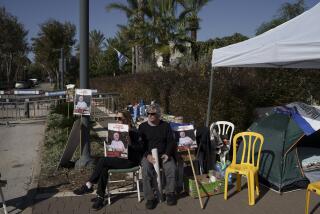Interim Premier Pleads for Unity to Battle Terrorism
- Share via
BAGHDAD — Struggling against an increasingly sophisticated kidnapping campaign, Iraqi interim Prime Minister Iyad Allawi made a stark plea to an anxious international community Saturday: Don’t abandon Iraq to terrorists.
“It is time for us to close ranks to fight terrorism,” Allawi told reporters in Damascus, on the Syrian leg of his get-acquainted swing through Arab capitals. “There is no way to budge to terrorists and give them what they want.”
Pressure to disengage from Iraq -- or stay away in the first place -- is mounting. The Philippines bowed to insurgents’ demands last week, withdrawing its troops to save the life of a kidnapped truck driver. And Egypt swore off the notion of sending soldiers or military officials after militants abducted an Egyptian diplomat in Baghdad.
Even the United Nations, which was set to return to Iraq this month, now says that without a protection force, only a few representatives will be able to start work.
“For the U.N. to build up a larger presence, we are going to need the security arrangements envisioned by the resolution” endorsing Iraqi sovereignty, Secretary-General Kofi Annan said Saturday. “That is, a dedicated force protecting the U.N. staff and its facilities.”
One violent month into Allawi’s tenure as U.S.-backed premier, Iraq’s security flaws appear serious enough to drive the country deeper into international isolation.
Around the world, there is a growing sense of uncertainty over building relations with the new Iraq -- how to help in bolstering security and whether governments can risk intense anger at home by sending troops or officials into a volatile, politically contentious Iraq.
The newly appointed U.N. envoy to Iraq, Ashraf Jehangir Qazi, said security was “the first priority, the second priority and the third priority.” On a fatalistic note, he added, “Ultimately, of course, life and death are in the hands of, as we say, God almighty.”
The United Nations hasn’t stationed staff in Iraq since its Baghdad office was bombed in August. Despite its goal of returning to Iraq as soon as this month, Annan said that only Qazi and a “small staff” will enter Iraq in August.
Meanwhile, the kidnappings appear to be becoming more deliberate. In a brazen abduction Saturday on the streets of Baghdad, militants kidnapped the director of a government-run construction firm. Two Pakistanis were also feared kidnapped.
Allawi’s brief appearance in Cairo last week -- and Egypt’s pledge to help Iraq fight insurgents -- apparently inspired armed radicals to track down Egyptian diplomat Mohammed Mamdouh Helmi Qutb and kidnap him outside a mosque after Friday prayers.
In a video aired soon afterward on Al Jazeera satellite channel, the kidnappers denounced Egyptian Prime Minister Ahmed Nazief’s assurances that Cairo was ready to help Iraq restore security. The militants warned Egypt to abandon any plans of cooperating with the interim government.
“Sending troops or Egyptian military personnel to Iraq is not an issue on the table at all for Egypt,” Egyptian Foreign Minister Ahmed Aboul Gheit said after the diplomat was captured.
The kidnapping of Qutb was particularly sensitive because it put Egypt, a leading Arab nation and key U.S. ally, into the spotlight when the Arab world is grappling to find a way to relate to the new Iraq.
After the unilateral invasion and occupation of Iraq by U.S.-led troops, many Arab governments were caught between pressure to back the United States and domestic fury over the occupation of Arab lands. Most Arab governments dismissed the question of deploying troops as unthinkable as long as the U.S.-led coalition was running the country.
With the June hand-over of sovereignty to Iraqis, there was hope that tensions would ease and that Arab governments might offer more help in keeping peace and rebuilding the shattered country.
“Recently there is a move, an indication, that Islamic countries may want to go to Iraq, may want to send troops,” Annan said Saturday.
But although Arab governments have offered some support -- Jordan, for example, trains Iraqi security forces -- they have balked at drawing attention to their aid or sending troops into Iraq. Neighboring countries have been particularly reluctant, pointing out that they are already too close for comfort and that tribal ties and economic interests hinder them from entering Iraq as neutral forces.
The kidnapping of the Egyptian diplomat comes on the heels of the Philippines’ capitulation to insurgents. After a Philippine truck driver appeared on television surrounded by masked gunmen who threatened to behead him, the country pulled its 51 peacekeeping soldiers out of Iraq a month ahead of schedule.
The abductors kept their word: The driver, a father of eight, was set free. Dismayed Iraqi officials warned that the Philippines had set a dangerous precedent that could induce insurgents to redouble their kidnapping drive.
“It was regrettable,” Allawi said. “It’s no way really to give in to the terrorists’ demands.”
Allawi appealed Saturday to “all the civilized societies, all peace-loving societies,” to band together. He urged Egypt to take a different, bolder path than that of the Philippines.
“The only way to deal with terrorists is to bring them to justice and to close ranks,” he said. “We hope that Egypt and the Egyptian government would act accordingly.”
But even as he spoke, a Kuwaiti company was reportedly negotiating with insurgents in hopes of freeing seven truck drivers seized last week. The radicals threatened to behead their Kenyan, Egyptian and Indian hostages one by one unless Iraqi prisoners were freed from Kuwaiti and U.S. jails.
“Some media networks are indirectly marketing terrorism by broadcasting their statements and demands,” a high-ranking source at Iraq’s Interior Ministry said Saturday. “When terrorists offer 72 hours for their demands to be met, we are facing a problem.”
More to Read
Sign up for Essential California
The most important California stories and recommendations in your inbox every morning.
You may occasionally receive promotional content from the Los Angeles Times.













